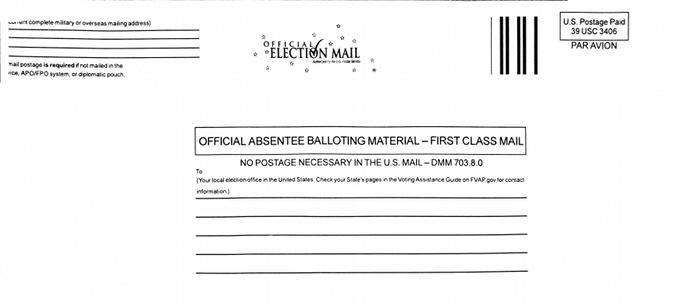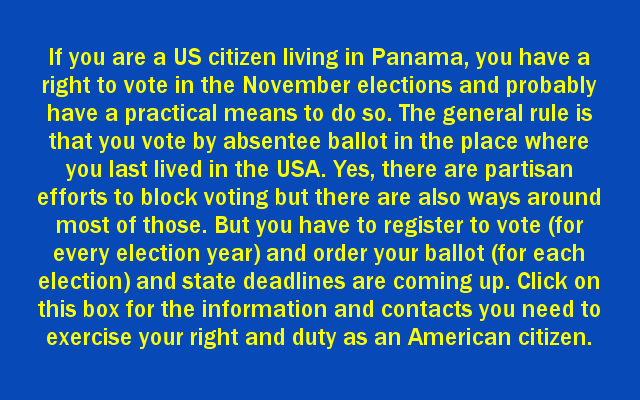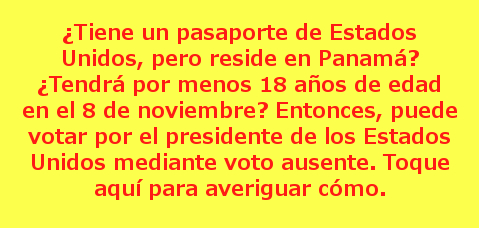
US diplomats won’t tell you for whom to vote, but they will help to get your vote counted
by Eric Jackson
Are you an American who takes US citizenship seriously? Deadlines to exercise your rights and fulfill your duty rapidly approach. Consular officer Rolando Diaz, a Texas political activist before he came to the US State Department, explained it to several dozen Americans — expatriates, naturalized citizens, people who were born dual citizens in Panama as the children of US citizens — at an August 31 meeting at the US Consulate. It was one of several presentations by the embassy and consular staff to bring the community up to date about this cycle’s procedures for voting from abroad.
Diaz referred to federal laws about voting from abroad — for example, government-subsidized free postage for voting materials mailed through US diplomatic missions — but emphasized that each state has its own rules about voter qualifications and deadlines to register and get ballots back to local election officials in the United States. How complicated can it get? “Texas has one election law for the entire state,” he noted, “but many local officials with their own interpretations of what that means.” So how to sort it out? Diaz recommends one of the several online sites to help US citizens vote from abroad, the Federal Voter Assistance Project. State by state, this service that was primarily established for US military personnel and dependents overseas but now also serves all Americans living overseas, makes it easy for you to register to vote, request an absentee ballot or check the status of your ballot.
First, you need to determine where to vote. Generally this will be by absentee ballot to the last place where you resided in the USA. But there are special considerations for American citizens who never lived in the United States. There are 37 states that allow a US citizen who hasn’t lived in the USA to vote in that state if one of his or her parents resided or was domiciled there. How “residency” and “domicile” are defined are matters of state law, but by federal law a person who only votes for federal offices — President of the United States, US Senator or US Representative — can’t be declared a resident of the state in which she or he casts those votes for purposes of state income tax liability.
A few states allow you to vote by email or fax. Many more states allow you to register to vote and order your ballot electronically and some of these will email your ballot to you. With most states you have to mail a printed and filled out ballot back to local voting officials by snail mail. Deadlines to register and request your ballots start coming in early October. In most US jurisdictions a ballot needs to be at the local clerk’s office by election day — November 8 this year — to be counted. Some want the ballots back earlier than that, some will count a ballot that comes in late but was mailed on or before election day. A few states have same-day voter registration and for overseas voters will accept a registration, ballot request and filled-out ballot in a single mailing.
What is the usual bottleneck for Panama, especially for those of us who live in the Interior? By federal law there is the Federal Write-in Absentee Ballot (FWAB). Those who have registered to vote and requested their ballots from the states and who have not received their ballots can fill out and send in one of these ballots. As a matter of law they are perfectly valid, although there will surely be some local election officials who will toss them in a provisional ballot box, the contents of which they will not count. In a contested close election, these votes preliminarily cast aside are likely to be examined and argued over by lawyers for the rival campaigns. In this era of widespread and sometimes flagrantly unlawful vote suppression, the FWAB of someone who was not sent a ballot because some committee using bogus information convinced some clerk that a properly eligible voter should be disqualified may become a court case. If that happens one of the drawbacks to casting a write-in ballot on the federal form is that the right to a secret ballot is waived by using that procedure.
There is also a standard federal form, the Federal Post Card Application (FPCA), to register to vote and request a ballot. But look up the information for the state where you will be voting first, because you may be able to submit this or some equivalent state form online and save the time and effort entailed in mailing in the FPCA form.
State voting laws are an ever moving set of targets. The day that Diaz gave his presentation at the consulate, an evenly divided US Supreme Court upheld a lower court ruling that struck down North Carolina’s racially motivated vote suppression laws. Not long before that the governor of Virginia, having been struck down by the state courts on a blanket move to end the ban on voting by convicted felons who have served their time, individually commuted sentences to restore the voting rights of some 13,000 Virginians who had been convicted of crimes — and on the day of Diaz’s presentation Republicans in Virginia’s legislature moved to hold the Democratic governor in contempt.
One of the most common vote suppression tactics is the voter ID law. Since the last presidential election 17 states have passed versions of these, two of these states have had those laws struck down and most of the other state laws of this sort are being challenged in court. One typical requirement is that only a state driver’s license will suffice. In Alabama they did that, and then closed all of the offices where licenses can be obtained or renewed in counties with black majorities. Some states have refused to accept Veterans Administration IDs from disabled vets who are physically unable to drive. It can be expected that some states, or some local officials, will demand expensive to obtain ID from overseas voters. The cost of renewing a US passport, or of travel to the USA to get or renew a driver’s license, could reasonably be argued to be an unconstitutional poll tax if it is made a requirement for voting. Perhaps your challenged FWAB will be the case that decides this. But in the event that an election official in the USA demands a valid passport as voting ID, the US Consulate here will consider that an “emergency” on a par with a death in the family back in the States, so as to allow you to obtain or renew a US passport on an expedited basis.
You can go to window 14 of the US consulate to mail your registration, ballot request or filled-out ballot right now. They close at noon, however, so you have to go in the morning. For security reasons it has been decided not to have a mailbox in front of the consulate. (Jihadis, Aryan resistance fighters et al will have to deposit their letter bombs elsewhere.)
Diaz recommended that voters get their ballots to the consulate by October 28 to be reasonably sure that election officials in the various states will receive them by election day.
~ ~ ~
These announcements are interactive. Click on them for more information.











